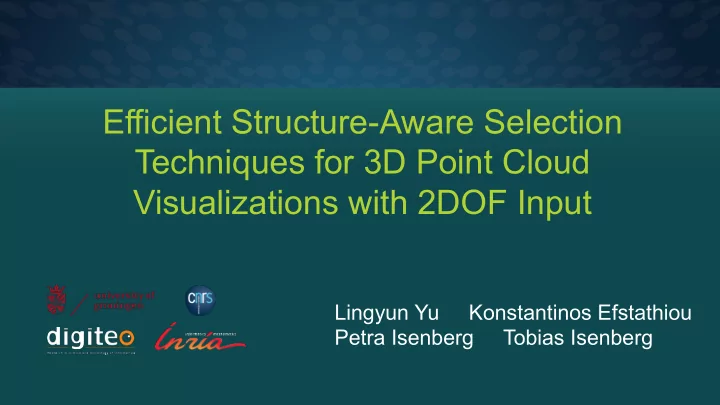

Efficient Structure-Aware Selection Techniques for 3D Point Cloud Visualizations with 2DOF Input Lingyun Yu Konstantinos Efstathiou Petra Isenberg Tobias Isenberg
http://yulingyun.com/projects/cloudlasso/ Honorable Mention Award, IEEE visualization conference 2012
The Problem: Selection of 3D Subspaces • 3D spatial data—basis of many visualization research questions • Problem: how to efficiently select subspaces in 3D? – Cannot select particles one by one – iterative selection too tedious
A New Interactive Selection Technique • spatial selection rather than object-based selection • two-dimensional input (PC, touch displays) • 2D lasso interaction: intended selection • structure-aware selection in 3D depth
A New Interactive Selection Technique • observation: similar constraints as in sketch-based modeling: → definition of 3D space based on 2D input [Igarashi et al., 1999]
Video: TeddySelection
TeddySelection: Pros & Cons • benefit – structure-aware selection – compact selection volume – fast selection ( ≈ 0.2 sec.) • criticism – problems in sparse regions – volume always connected, does not work well for many small clusters
CloudLasso • goals – same selection procedure as before – overcome limitations of TeddySelection → be able to treat clusters • idea – base the selection volume on global particle density estimation – i.e., selection mesh based on density field → marching cubes algorithm
CloudLasso: Principle 1. draw lasso 2. selection mesh construction – 1 st binning to fit generalized cylinder to data – fit regular grid (64 × 64 × 64) to enclose the lasso frustum – use kernel density estimation on grid – run marching cubes algorithm, but ensure to ignore parts outside lasso • threshold adjustment possible interactively
Video: CloudLasso Selection & Interaction
Evaluation & Validation: User Study • 12 participants (4 female) • 4 selection tasks (datasets) • measurement of time , error , and selection volume • questionnaire for subjective opinion
Study Results • CloudLasso (CL) always faster error bars: than CylinderSelection (CS) 95% CI – significant except galaxies • two error metrics F 1 & MCC – CloudLasso always less error than CS – F 1 significant except galaxies – MCC significant for clusters & shell/core • CloudLasso volume always smaller, significant for strings dataset • CloudLasso the preferred technique for all participants
Discussion: ClouldLasso vs. TeddySelection • both spatial & structure-aware selection • both based on lasso principle • TeddySelection: connected selection • CloudLasso: individual clusters • CloudLasso can handle difficult cases • both can be coupled with Cylinder- Selection using Boolean operations
Thanks for your attention! Video & demo: http://yulingyun.com/projects/cloudlasso/
Recommend
More recommend